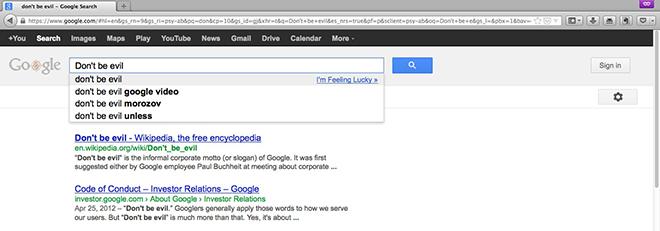European Union regulators have accepted a proposed solution from Google to end an antitrust probe questioning whether the search giant uses its dominant market position unfairly, but Google's competitors are reportedly unsatisfied with the deal.
The deal between Google and the European Commission would see Google clearly labeling search results from its own properties — such as Google Plus Local and Google News — and sometimes showing links from rival search engines, sources familiar with the negotiations told The New York Times. Google would not be required to alter the algorithm that produces its search results, and the changes likely would not show up on users' screens for at least a month.
The EU's antitrust investigation looked into whether Google was using its search dominance to tout its own services ahead of those of its competitors. Large Internet and software rival Microsoft was one of the primary complainants before the European Commission, but Microsoft was joined by smaller players, including British comparison shopping site Foundem and social review site Yelp.
Aside from its alleged favoring of its own offerings, the plaintiffs also charged that Google disadvantaged competitors by pulling material from other web sites for search results.
The agreement would require Google to label Google-owned properties in areas where it doesn't make money from search results. In areas where Google does make money off of ads, such as local business reviews, Google would have to show links to at least three competitors. In areas like shopping, Google would auction links to rivals.
The search company would also be required to allow competitor services the ability to block as much as 10 percent of their web content from displaying in Google search results. Google, then, would be unable to, for instance, display hours of operation from Yelp listings. Google would also have to make it easier for small businesses to move their ad campaigns to other search engines.
Responding to the news that a settlement may be near, representatives for the plaintiffs told Bloomberg that the deal appears to be insufficient as far as they're concerned.
"If what has been proposed is a labeling or a modified form of labeling, frankly that's a non-starter," a lawyer for an industry group including Microsoft told Bloomberg. "We haven't seen the proposals and the commission hasn't explained them to us. We're in the dark."
Wood's group wants any settlement to "set out non-discrimination principles and the means to deal with the restoration of effective competition, plus effective enforcement and compliance" in order for it to be acceptable. The settlement would also have to be global in order for Google's competitors to be satisfied.
The EU settlement is another chance for Google's rivals to extract concessions from the search giant. Another antitrust case in the United States closed earlier this year with the Federal Trade Commission concluding that Google had been more interested in improving its search results than in stifling competition.
Any agreement Google reaches with the European Commission would be legally binding for a period of five years, with a third party ensuring compliance. A violation of such an agreement could lead to a fine of as much as 10 percent of Google's global annual sales.
 AppleInsider Staff
AppleInsider Staff

-xl-(1)-xl-xl-m.jpg)





-m.jpg)






 Amber Neely
Amber Neely
 Wesley Hilliard
Wesley Hilliard
 Marko Zivkovic
Marko Zivkovic
 Andrew Orr
Andrew Orr
 Malcolm Owen
Malcolm Owen


 Andrew O'Hara
Andrew O'Hara






24 Comments
European Union regulators have accepted a proposed solution from Google to end an antitrust probe questioning whether the search giant uses its dominant market position unfairly, but Google's competitors are reportedly unsatisfied with the deal.
Of course Microsoft isn't satisfied.
Of course Microsoft isn't satisfied.
Your analysis is both insightful and thought provoking.
-kpluck
This doesn't read as fair to me. It's much like what the EU did to MS with IE. This sounds like they trying to chop Google off at the knees so others can better compete artificially, not because they found Google to be doing anything inherently anti-competitive by showing the most popular results which happen to lead to their own services.
[quote name="SolipsismX" url="/t/156979/eu-google-antitrust-settlement-could-see-prominent-placement-for-competing-products#post_2310661"]This doesn't read as fair to me. It's much like what the EU did to MS with IE. This sounds like they trying to chop Google off at the knees so others can better compete artificially, not because they found Google to be doing anything inherently anti-competitive by showing the most popular results which happen to lead to their own services.[/quote] I disagree. It is demanding that Google stop using their power in Search to artificially inflate the importance of their other products. Just like the MS/IE situation, it is well established in both the EU and US that you can not use a monopoly position (or even dominant position) in one field to force others to use your unrelated products.
[quote name="jragosta" url="/t/156979/eu-google-antitrust-settlement-could-see-prominent-placement-for-competing-products#post_2310665"] I disagree. It is demanding that Google stop using their power in Search to artificially inflate the importance of their other products.[/QUOTE] if they are artificially inflated then I agree, but it sounds like they are wanting to artificially promote others. If that is incorrect I'm open to an explanation that reads differently than this article. [QUOTE]Just like the MS/IE situation, it is well established in both the EU and US that you can not use a monopoly position (or even dominant position) in one field to force others to use your unrelated products.[/quote] The problem with the EU and IE is that didn't do it when it was an issue. They did only recently when Firefox was common (especially in Europe) and even after Chrome had a high stake. IE has been at or below 50% for the world for some time and having over 90% of the world's desktop OS market with much of that being in the Enterprise their browser dominance is effectively nonexistent. I don't think it' wrong for them to offer a browser on an OS in the 21st century and if MS is required to offer alternatives then why not Apple or Google for their respective OSes? There was a time for this and it's long gone.